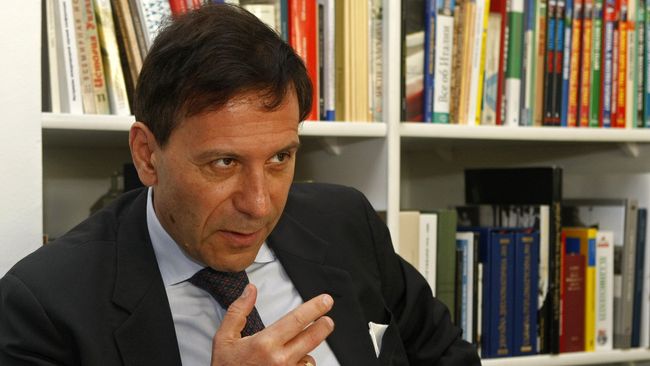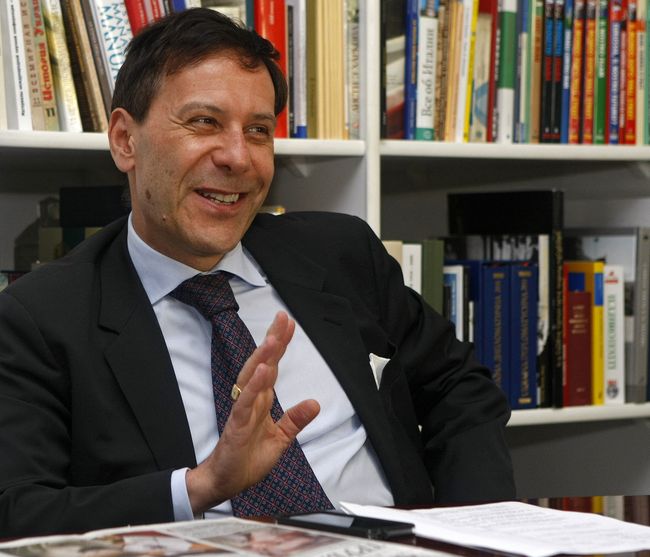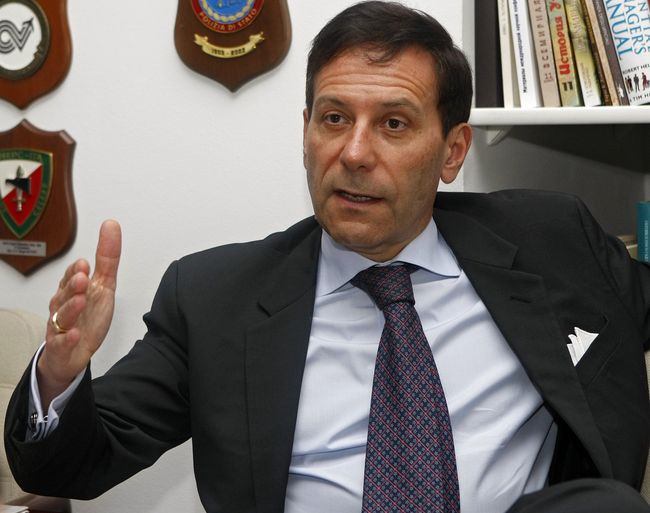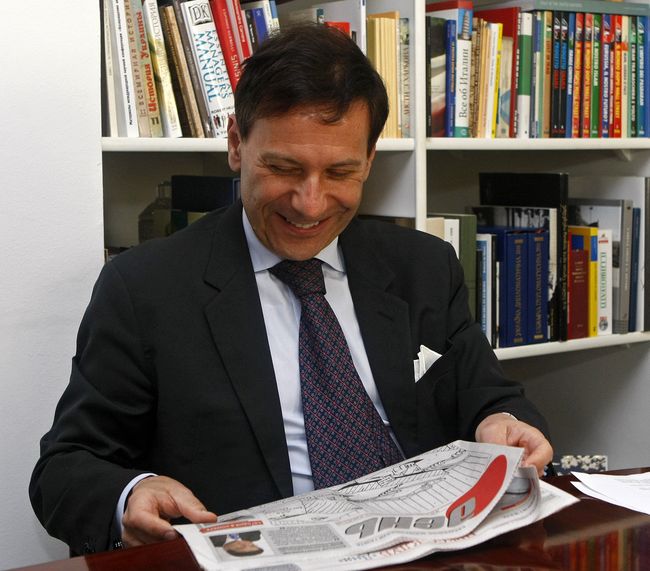On the “Italian system”
Fabrizio ROMANO: “It is very important now for all politicians and diplomats to make an effort to bring peace to Ukraine”
Recently, Ambassador of Italy Fabrizio Romano completed his diplomatic mission in Ukraine. In his last interview before the departure, given to The Day’s journalists, he did not avoid controversial topics, ranging from dispelling the Italexit concerns (derived by analogy from Brexit) to taking a stand on the Russian president accusing Ukraine of terrorism and clarifying the Italian position on the extension of sanctions against Russia. Romano also described things he was able to achieve in his term in the office and listed the conditions required for the Italian business to come to Ukraine. In addition, he promised that the creative links between our two countries would not be broken but would grow stronger instead.
“BLOOMBERG’S TALK OF ITALEXIT HAS NO BASIS IN REALITY”
Mr. Ambassador, your nation has a constitutional referendum coming, and many Western observers, including those at Bloomberg, have expressed concern that Prime Minister Matteo Renzi may find himself in David Cameron’s predicament, that is, he may also lose the popular vote. Some experts have already started to use the word Italexit by analogy with Brexit. Could you please comment on this?
“Firstly, the referendum is a principled decision of our prime minister. And it must be respected as a decision taken by the head of government of a EU member state. As for Bloomberg’s speculations about Italexit, I want to remind you that the EU exists today thanks to Italy, which was a founding member of the European community. The mood of the Italian political class is different from the mood prevailing among the British political establishment before the Brexit vote. Therefore, I do not believe that Bloomberg’s talk of Italexit has any basis in reality.”

But why is that referendum a matter of principle?
“Renzi wants to reform the structure of the Italian government, to reduce the size of the Senate to 100 members and restrict its right to dismiss the government. And when it comes to reforms, there are always supporters and opponents. Therefore, we now have such a dialectic playing out, and this is a domestic Italian political affair. I earn my pay by informing Italy on Ukraine, not vice versa (laughs)”
“THE MINSK AGREEMENTS ARE THE ONLY TOOL WE HAVE TO INTENSIFY THE POLITICAL PROCESS”
The Five Star Movement is very popular in your country at the moment, and many large cities elected its representatives to power in recent elections. There is talk that the movement’s members may even come to lead the government in the near future. Does this mean that the wave of populism is engulfing your country as well? Do Italians see coming to power of such a political force as a real risk?
“Italy is a democratic country, and each party has the right to participate in elections and to declare its positions. When it comes to labeling something as populism, it largely depends on the personal opinion of the commentator and the level of political culture. If we talk about the presumed danger presented by this movement, it is also a matter of personal opinion. A lot depends on one’s point of view. There is no scientific approach here, but only purely personal ones. So I think if you ask a representative of the movement, they would not agree with this label. As a diplomat and an official of the Italian Ministry of Foreign Affairs, I do not have the right to tell my opinion in such terms and such colors in which you want me to do it, to say whether populism is dangerous or not. I prefer not to take sides.”
The Russian president accused Ukraine of terrorism lately. In addition, he said that he saw any further Normandy format meetings as pointless. What do you think about this statement and the Minsk process in general, which is a product of the Normandy peace talks?
“Indeed, the results of the Minsk process have been less satisfying so far than we would like them to be. But still, it must be said that the Minsk Agreements have moderated the conflict somewhat. On the positive side, the Minsk process has brought an intensified dialog. In the opinion of the Italian government and diplomacy, the Minsk Agreements are the only tool we have to intensify the peace-building political process. I think we have to work with this tool, the political process, so that it does not stop. We have already experienced positive and negative moments, and such statements bring disappointment. We, I mean the Italian government, will do everything to restore this dialog.”
ON A PECULIAR FEATURE OF THE ITALIAN APPROACH TO DECIDING WHETHER TO EXTEND SANCTIONS AGAINST RUSSIA
We are grateful to Italy for its parliament’s refusal to follow the lead of some regional authorities which have adopted resolutions calling for the lifting of sanctions against Russia. What will determine whether Italy extends its sanctions against Russia?
“On the one hand, regional councils may vote for whatever measures they think necessary. And they called on the government to analyze the effects on the Italian economy from both the EU sanctions and anti-European sanctions imposed by Russia. Now, such appeals had long been heard from the regions which had cooperated with Russia for a long time, and our exports are particularly dependent on the Russian market.
“On the other hand, the regional authorities have no foreign policy powers, it being the exclusive province of the central government. The latter has been so far unflinchingly committed to decisions taken during the Italian presidency of the EU in 2014.

“Not all other governments have been that principled. I do not know what the future will bring. As for the talk about possible easing of the sanctions, I can say that the Italian government has decided to impose sanctions and keep them on until the Minsk Agreements are fulfilled.
“However, a peculiar feature of the Italian approach is that we want to discuss this issue not at the level of officials of the European Commission, but at the political one, which of course means a meeting of foreign ministers in Brussels.”
Why is it so?
“This is a very important issue with great political ramifications. Russia is a major player in international politics. Our prime minister was very clear on it. Therefore it is necessary to intensify the political approach rather than the technical one.”
“FROM AN ECONOMIC PERSPECTIVE, UKRAINE IS A VERY INTERESTING, HIGHLY-EDUCATED COUNTRY”
In his latest interview, the outgoing US ambassador said that he saw reforms being implemented in many fields in Ukraine. What do you say to that?
“This is an interesting topic. To begin with, reforms do exist outside of paper, and for me reforms are real things being done. Undoubtedly, the Ukrainian government, your institutions, including the Verkhovna Rada, are working very hard. According to the statistics I saw, it is the most hard-working parliament of Europe.
“With regard to the implementation of these reforms, honestly, I am finding it difficult to express a clear opinion at the moment. I can only tell what I know personally. For example, after my arrival in Ukraine, I set up a committee of Italian businesspeople. This is an important body which greatly helps to promote the understanding of Ukraine in economic terms. Most of our businesspeople here admit that there have been very interesting and positive changes in the banking system. There are, of course, flaws as well.
“And here we must proceed from the fact that UniCredit, the largest Italian bank, has decided to sell its Ukrainian affiliate, although they will retain a share amounting to about 10 percent. This is due to the dysfunctional business climate prevailing here. This decision was taken after the Maidan events, mind you. It is a fact which you need to accept, and this should be an incentive for the parliament and the Ukrainian political class to do everything in their power to ensure that foreign businesspeople can effectively work in Ukraine.
“If we talk about reforms, the most important area is justice. And unless you achieve good results in it – I am speaking now on behalf of Italian businesspeople – they are unlikely to be able to come to Ukraine, as long as there are no effective reforms in that field.”
Has anything changed after Volodymyr Hroisman’s appointment as prime minister?
“I think that it is still too early to judge. He has been in the office for a little over 100 days. Of course, I hope that the business climate will improve. I am even sure it will, because from an economic point of view, Ukraine is a very interesting, highly-educated country. People here are competent, therefore improvements have to happen.”
“MY PRIORITY WAS TO DEVELOP THE POLITICAL DIALOG AT THE BILATERAL LEVEL”
To sum up, which of your intentions you have seen implemented, and which you have not?
“First of all, my priority as a diplomat was to develop the political dialog at the bilateral level. I am very happy that the last two years saw more visits, meetings, contacts than all the previous years since the opening of the Italian embassy put together. I am very proud of it. The most recent phone call between ministers of foreign affairs of Ukraine and Italy took place just four days ago [the interview was recorded on August 12. – Ed.].

“Secondly, I see the spatial expansion of the embassy after my arrival as a positive development: we now occupy two buildings which house all our institutions. We have the name for it, it is the ‘Italian system,’ when all the missions are located in the same building or under the same roof. I feel free to state, and let modesty be damned, that the building we occupy is a monument of architecture. We have located all the departments here, including the visa bureau, the consulate, the cultural center, offices of military attache and law-enforcement liaisons, and the institute of foreign trade, which is the second in Europe after Moscow going by the number of employees. I think the Ukrainian office of Italy’s National Tourism Agency will return here as well. In addition, we have been able to open six visa centers in Ukrainian cities, and it is very important in my opinion, because they make life easier for ordinary Ukrainians who want to go to Italy.
“Thirdly, one of the main priorities of my work was to strengthen cooperation in the cultural sphere, and I am very pleased with the success we have achieved in that field.”
Our country has fulfilled all the conditions for visa-free travel, but the EU is still withholding its approval on the issue. What is your country’s position on it?
“Italy does not object to granting visa-free travel to Ukraine. We have always been supportive and never voted against it. You have wonderful citizen ambassadors in Italy, I mean the Ukrainian community. The Italians have a very positive view of Ukraine and, by the way, this is the biggest Ukrainian community in Europe. I know that granting visa-free travel depends on technical requirements to be fulfilled by those countries that already enjoy visa-free travel, or those standing in line to get it. In this respect, Italy is a supporter of visa-free travel for Ukraine.”
“CREATIVE LINKS BETWEEN OUR COUNTRIES WILL NOT BE BROKEN, BUT WILL GROW STRONGER INSTEAD”
For many years, culture and the arts have been an important component of relations between our countries. During your time in office, several interesting creative projects appeared. We know you as a highly knowledgeable music lover, and you have continued a long-standing creative tradition which has seen the Embassy of the Republic of Italy and the Italian Institute of Culture in Ukraine sponsoring joint musical projects with the National Opera, Philharmonic society, and the National Music Academy teams. Limiting ourselves to recent high-profile events only, we saw production of the opera Nabucco, a gala concert to mark the Day of Europe in Ukraine, and many other evenings of classical music and master classes. Do you think the musical heritage can help people of different mentalities to quickly find a common language?
“Culture and the arts are very important to people, but today we live in a world which the sociologists call the ‘liquid society’ and the ‘complex society.’ In particular, the famous sociologist Zygmunt Bauman believes that we are transitioning from a complex structured world, which is burdened with various networks of social obligations and conditions, to a flexible, fluid, borderless and conditionless one. The latter is in a state of continuous movement, melting, overflowing. It is the beginning of a mobile stage, that of the construction of a new reality. The human being becomes mobile and thus the ‘individualized society,’ ‘liquid society’ is born. The famous philosopher Karl Popper, who vigorously defended the principles of democracy, said that we had to make possible the prosperity of the ‘open society.’ I would add that it should be the ‘multifactor society’ as well. Culture plays a major role, but only as part of a wider system, while taken alone, it will not be able to unite people of different mentalities...”
2014 saw the birth of the Italian Baroque music festival ITALIA FESTIVAL BAROCCO, which was held for the third time this May. Nancy Milesis Romano is the art director and the “soul” of the forum. The festival has established its credibility and has many fans. Ukrainian music lovers hope very much that it will continue to exist after your and your wife’s departure from Kyiv.
“We are very pleased that the Ukrainians have fallen in love with the festival and that thanks to it, your music lovers can now be introduced to masterpieces of Italian baroque music. The concerts’ programs included leading musicians, conductors and singers of our time who specialize in that repertoire. Lectures and master classes held at the National Music Academy of Ukraine also aroused great interest. By the way, our embassy will sponsor the Ukrainian premiere of Gioachino Rossini’s La Pietra del Paragone (The Touchstone), to be held on the stage of the Opera Studio at the end of this year (this work has never been performed in Ukraine). I hope that the fourth festival will happen! My wife and I will make every effort to that end, and I hope that the tradition will continue.
“I am convinced that creative links between our countries will not be broken, but will grow stronger instead.”
A sculpture portraying the great poet Dante Alighieri has been unveiled on St. Volodymyr Hill in Kyiv. This place has become a symbol of Italy in Kyiv, and residents and guests of our capital have already fallen in love with it. Could you please tell us more about this wonderful project?
“The idea has existed for a long time in the framework of an intergovernmental Italian-Ukrainian project, which was always stalled due to time or money constraints. We were only able to implement the project last year thanks to the help of Ukrainian and Italian sponsors, as well as the mayors of Kyiv and Carrara (incidentally, rare white marble came from the latter city, from the very quarry which once produced marble for the great works of Michelangelo). The sculpture was installed to mark the 750th anniversary of the great Italian poet Dante Alighieri. It was carved by Italian sculptor Luciano Massari. The architect of the project was Leonid Maly. I am very pleased that Kyivites and guests of your capital have come to love this location. Even before the official unveiling of the monument, people spontaneously gathered there and recited the classical poet’s verses in various languages.”
“I AM VERY GRATEFUL TO ALL UKRAINIAN AGENCIES WHICH HELPED US TO GET BACK THE MASTERPIECES”
In June, the Khanenko Museum hosted the exhibition “Salvaged Treasures of Italy: 17 Paintings from the Collection of Castelvecchio Museum in Verona.” These works were stolen by criminals in November 2015, but lately found and rescued in Ukraine. Kyivites and guests of our capital queued for hours in long lines to see the pictures...
“I am very grateful to President of Ukraine Petro Poroshenko, who visited the exhibition on the opening day, and all the Ukrainian agencies which helped us to get back the masterpieces.
“Each of the 17 paintings is priceless, since no artwork can be replicated in case of loss. The paintings rescued from the hands of the robbers include true world-famous masterpieces, the artistic significance of which cannot be overestimated. The cultural value of the exhibition is the highest since the inception of the mutual relations between our two countries! People queued for hours in huge lines, braving heat and rain, so we even had to extend the exhibition’s duration. Over 20,000 visitors got acquainted with the masterpieces from the collection of Castelvecchio Museum in Verona while they were exhibited in Kyiv. Grateful Mayor of Verona Flavio Tosi has decided that all Ukrainian citizens may visit the museums of Verona for free until the end of this year.
“By the way, I would like to remind your readers that this is not our first exhibition on such a scale to be held in partnership with the Khanenko Museum. For example, we had a great success with the exhibition ‘Three Masterpieces of Classical Art from Museums in Italy: Raphael, Titian, Guido Reni.’ This unique display was created in the framework of the European Dimension project in cooperation with the Ministry of Culture and the culture department of the Kyiv City State Administration. Three world-famous works of the 16th and early 17th century, which usually do not leave Italian museums, were displayed here for the first time, and the month-long exhibition attracted over 10,000 visitors.”
“A BIT OF MY HEART WILL REMAIN IN UKRAINE”
You have been working in this country in a difficult period, marked by the Maidan protest, the Revolution of Dignity, the annexation of Crimea, the war in eastern Ukraine, and the financial crisis, but, despite all the difficulties, the Ukrainians are defending their right to live in a stable European nation. After over four years of work in our country, what was the most memorable impression for you? What new things have you discovered, and what keepsakes will you bring home from Ukraine?
“I will remember everything! It was a really difficult but interesting period. By the way, when I served as the ambassador in Georgia in 2003, I also witnessed a difficult period, as the Revolution of Roses started. Not every diplomat happens to become an eyewitness to the events that have already gone down in history during their term in office. Unfortunately, the war in the east is not over yet... It is very important now for all politicians and diplomats to make an effort to bring peace to Ukraine. Let me remind your readers that Italian artists have supported your country, no invited artist refused to go on the tour here, and all the concerts were mightily sold out!
“I will go back to Rome at the end of this month, but a bit of my heart will remain in Ukraine. I wish your country prosperity. You have a great potential. It is a pity that I could not get acquainted with all regions of the country, but every city that I visited, including Donetsk, Dnipro, Lviv, Mariupol, Sumy, and Kharkiv, made an unforgettable impression. Still, I especially loved Odesa, which can be considered the ‘most Italian’ city in Ukraine due to its history, architecture, and the overall spirit, and, of course, Kyiv, where I lived. I do not say ‘Farewell,’ but rather ‘See you again,’ and hope to come to Ukraine once more (as a tourist), and if I ever decide to write memoirs, I will get around to it when I retire.”
Newspaper output №:
№48, (2016)Section
Topic of the Day





